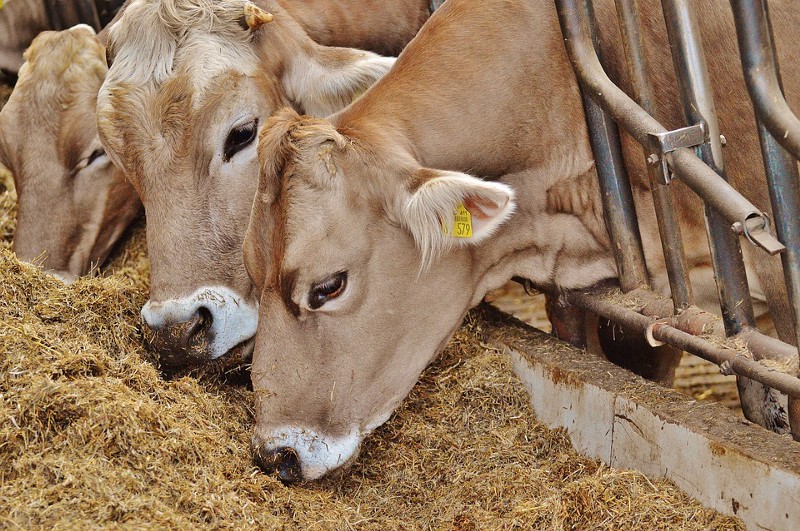The Forum of the Future is organising a Feed Compass for the Protein Challenge 2040. A multi-stakeholder group is creating a set of criteria and an easy-to-use tool to help compare different types of feed, with the long-term goals of helping to produce sustainable feed, future-proof value chains, and ensure food security.
https://medium.com/@FuturesCentre/which-animal-feeds-are-fit-for-the-future-881c293cb9b
The Compass will build from current work done in the feed space, including the LEAP Feed Guidelines, and will involve organisations such as the Ahold Delhaize, Calysta, Evonik, Food & Agriculture Organisation (FAO), FEFAC, Forum for the Future, Volac, Waitrose, and WWF-US.
For more information about this initiative, please contact [email protected]
A brief note prepared by Landbouw Economisch Instituut (Agricultural Economics Institute) (LEI) Wageningen University and Research Centre (UR) paints a picture of Central Asia’s agricultural potential and food security in the light of climate change. The Central Asian region comprised of Turkmenistan, Uzbekistan, Kyrgyzstan and Tajikistan are agrarian societies and net importers of grains and some other food crops. Agriculture in the region is vulnerable to climate change. Adaptation strategies to manage climate, such as more effective use of inputs, particularly of water, require financial means which the majority of farmers cannot easily afford. In the coming ten to twenty years, Central Asia’s susceptibility to the effects of climate change will be determined by socio-economic factors rather than by climate change itself. Read the article here.
The Joint Programming Initiative on Agriculture, Food Security and Climate Change (FACCE – JPI), together with the Belmont Forum, have launched an international call on Food Security and Land Use Change. The Collaborative Research Action (CRA) brings together Cyprus, Ireland, Israel, the Netherlands, Switzerland, Romania, France, the UK, Australia, Brazil, India, Japan, South Africa and the USA. This Collaborative Research Action focuses on the two-way interactions between the dynamics of food systems and land use change, including the implications of the change on biodiversity and ecosystem services. The total call budget approximates € 10 million, with 14 different countries participating. The call, involving two types of projects, will be open until September 30th. You can find all relevant information on the FACCE website under “FACCE activities”. For more information see the official press release.
The Commission on Sustainable Agriculture and Climate Change was set up in 2011 to come up with an integrated approach for dealing with the urgent and globally interconnected challenges of climate change and agriculture. Their final report, which was launched 28 March 2012 at the Planet Under Pressure conference, offers concrete actions to transforming the food system to achieve food security in the face of climate change. Read more about the Commission and download the report from their website.
The FAO has launched a new Global Soil Partnership for Food security and Climate Change Adaptation and Mitigation.
The partnership is developing an Action Plan on sustainable soil management that will develop synergies between partners and bring together work currently being done separately on soil survey, assessment and monitoring, soil productivity, soil carbon, soil biodiversity and ecology and soil and water conservation. Read the article
As demand grows for new means of feeding a global population expected to reach 9.5 billion this century, scientists worry that funding for agricultural research is falling around the world.
Dr Richard Richards of the Australian science agency CSIRO’s plant industry division said scientists from a wide spectrum of disciplines would be needed.”We need to combine advances in genetic technologies with opportunities for better crop management.” Read the full article.
The Consultative Group on International Agricultural Research (CGIAR), the world’s largest international agriculture research coalition, approved six new programs, totalling some $957 million, aimed at improving food security and the sustainable management of the water, soils, and biodiversity that underpin agriculture in the world’s poorest countries.
Read more at the CGIAR fund website.
Voice of America article on the aims of the Alliance to meet food and climate change concerns “We’re bringing together two big ideas here. The world’s got to produce a whole truckload of more food in the next 30 years to feed three billion more people that are going to be on the planet…. And we’ve got to try and reduce the emissions intensity of that,” said Tim Groser, New Zealand’s minister of trade, who’s also responsible for the country’s climate change negotiations. Read the full article
The Wall Street Journal links the Global Research Alliance with a speech made by Kofi Annan, former Secretary General of the United Nations. “Climate change is estimated to have increased the global food bill by $50 billion a year. Mr. Carter argues that science will be able to deliver where politics has failed: to devise a global approach to tackling food security and climate change, two of the world’s most pressing issues” Read the full article
Farming First reports on the Ministerial Summit and the Launch of the Latin America Research Partnership funded to meet the goals of the Alliance.
The New Agriculturalist posts a news article on the Ministerial Summit “The reality is that globally, not enough research has been focused on reducing agruicultural greenhouse gases, compared to other sectors such as energy and transport. The Alliance changes this.” Read the full article
A recent posting on ‘Investment in agriculture and access to markets will help to feed the world’ from the Poverty Matters Blog ahead of the G20 agriculture meeting mentions the Global Research Alliance as an excellent example of coordinating research resources.
“at the global level, new alliances are coming together to co-ordinate research funding and policy harmonisation. A great example of this the Global Research Alliance on Agricultural Greenhouse Gases, which brings together more than 30 governments to pool funding allocations and co-ordinate research. The alliance’s goal is to improve the agricultural system’s ability to grow more food without increasing greenhouse gas emissions.”
Read the complete post at the Poverty Matters Blog on the Guardian.co.uk website.

